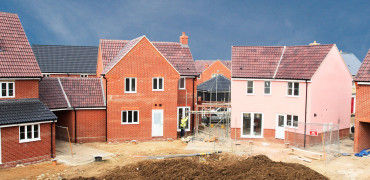Theresa May’s decision to hold an early general election shouldn’t really have come as a shock if you look back at recent political history. If nothing else, politicians tend to be pragmatists and opportunists, and this opportunity to strengthen her majority on the back of a recent groundswell of nationalistic fervour, although in a different set of circumstances, is not really all that new.
Whether or not you think it was a decision that was genuinely taken ‘in the interests of the country’ as she maintains is another matter, however what those ‘interests’ are, like those mythical ‘British values’ probably differ depending on who you speak to. What is for sure is that we are in for an almighty dust-up with EU ministers over money once the seemingly inevitable happens and May’s administration is returned.
While the EU divorce is hammered out (and don’t be surprised if desks are hammered by fists), housebuilding needs to get on with things. If the highly unlikely scenario of Corbyn entering No. 10 happens, then Labour has promised to build a million homes (sound familiar?) but with half being social housing, therefore in some ways an even taller order than the current administration’s ambitions.
The National Audit Office’s recent ‘Housing: State of the Nation’ report confirms what we all know, that housebuilding has not kept pace with need, but highlights that this is “particularly acute” in London. It is forecast the capital will see 227,000 new households appearing every year until 2021, substantially higher than the annual average of 166,000 extra homes in England over the last 10 years. Achieving the government's million new homes ambition by 2020 will require 174,000 additional new builds and conversions per year, says the NAO.
The Government watchdog says that DCLG (The Department for Communities and Local Government) is “reliant on the market to achieve its housing objectives” and adds that it is “not yet clear what impact the EU Referendum decision to leave the EU will have on the market.” It points to the fact that despite a slowdown post-Referendum, there have recently been “modest increases” in house sales in England.
However with recent figures on the economy looking fairly stark, the prognosis for achieving the targets is even more uncertain; if people have less money in their pockets as inflation worsens, less houses will be built. Housebuilding is after all one of the more demand-based industries and one which is even more risk-averse following the recession.
No matter how big the demand for homes, if they’re not affordable then no-one wins.

The demand for housing
If new homes are not affordable then no one wins.
Despite GDP slowing up sharply to 0.3 percent in the first quarter of 2017, construction was performing perhaps better than expected, with housebuilding at a four-month high according to the Purchasing Managers’ Index. This has been put down to the overall resilience of the UK economy but it is somewhat strange in the context of the slowing of growth, which some have called the ‘first signs of the Brexit effect.’ Of course, the gap between wage growth and inflation is not new and has a direct effect on the ability of buyers to buy homes. With a continuing weak pound as a result of Brexit, no matter how big the demand for homes, if they’re not affordable then no-one wins.
Mark Farmer has been no cheerleader for the construction industry, with his Farmer Review taking aim at all sorts of problems in the supply chain. The Government has since admitted the industry is “broken”, but has its White Paper offered any concrete solutions or is it largely tinkering?
Responding to the recent DCLG select committee report on the housebuilding industry’s capacity, he agreed that more diversity was needed in the market “both in terms of tenure and delivery models.” He added that stable policy direction on this beyond 8 June would be ideal, however, this sounds like wishful thinking given that Brexit is the sole focus.
There are so many issues at play, all wrapped up in a huge political upheaval which many millions in the country did not want to see and believe is misguided. While a lot of potential housebuyers now have to rely on Build to Rent, at least the current (and likely future) Government has recognised the issues in the White Paper and is doing things like tracking offsite construction actively within its Accelerated Construction Programme.
Last but not least, the select committee saw enough seriousness in the construction industry’s reliance on overseas labour to request that it be included explicitly in the Brexit negotiations. With skills shortages highlighted as the big issue in a netful of big issues, if this one doesn’t get tackled (whether or not it’s a vote winner) we could see a lot more people waiting for homes.
James Parker is editor of Housebuilder & Developer magazine
If you have any questions about this article or want to know more, please email us. We will contact the author and will get back to you as soon as we can.


